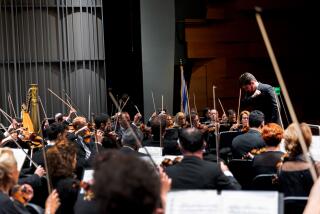The panorama of Jewish music is at Idan Raichel’s fingertips
- Share via
A few years ago, Israeli keyboardist-composer Idan Raichel came up with an intriguing musical concept: create an ensemble capable of playing music reaching across the spectrum of Jewish culture. It would include not simply the traditional Eastern European material but also songs in Hebrew, Arabic and -- perhaps most interesting -- in the Amharic language of the Ethiopian Jews who, even now, are struggling in their effort to return to the Israeli homeland.
The ensemble’s first recording, “The Idan Raichel Project,” released in 2002, quickly became triple platinum in Israel, with four hit singles, and was released this month on the new Cumbancha label in the U.S.
Raichel brought a touring version to the Wilshire Theatre on Thursday, showcasing a slimmed-down version of virtually all the music from the CD.
The results were fascinating on several levels.
Although the songs -- especially the lovely “Im Telech” (If You Go) -- were familiar from the album, the difference in scope and perspective was obvious.
The CD is a large-scale project, incorporating dozens of musicians and numerous electronic effects. In the performance by the touring group -- five musicians (including Raichel) and three singers -- the effect was more intimate and, for some of the material, more engaging.
Ethiopian singer Cabra Casey’s rendering of Raichel’s “Ulai Ha’Pa’am” (Maybe This Time) was particularly affecting, and Lilat Gabai moved smoothly through the sliding, melismatic phrases of “Azini” (Comfort Me). Avi Wassa, also Ethiopian, took a more strutting stance in the celebratory “Brachot Le’Shana Chadasha” (Blessings for the New Year), roving the stage with the electric presence of a rock star.
A few numbers featuring the oud and tar of Yaacov Segal invoked traditional Middle Eastern sounds.
The dreadlocked Raichel presided over everything from behind a bank of keyboards, occasionally singing solo or backup, constantly exerting magisterial control over the unfolding of a panoramic sequence of songs.
The house was packed, and the audience, clearly familiar with virtually every number, responded with cheers, shouts, sing-along choruses and standing ovations.
On the down side, there were numbers in which the reduced ensemble simply couldn’t match the multileveled timbres of the recorded versions of the songs.
And when the Project occasionally slipped into the bland rhythmic and harmonic predictability of faceless, international rock music, one had to resist the impulse to urge Raichel to get back to the more authentic stuff.
More to Read
The biggest entertainment stories
Get our big stories about Hollywood, film, television, music, arts, culture and more right in your inbox as soon as they publish.
You may occasionally receive promotional content from the Los Angeles Times.










